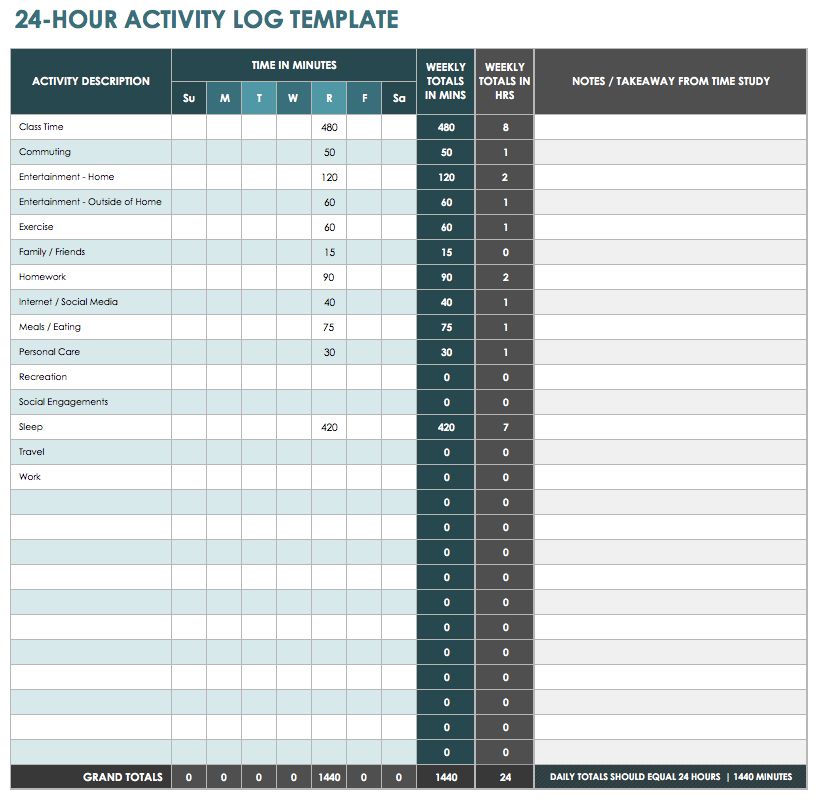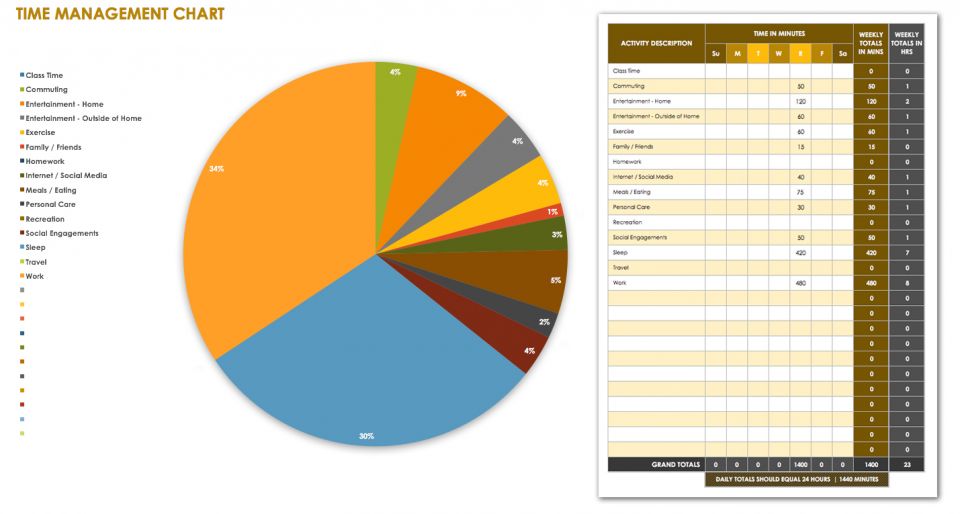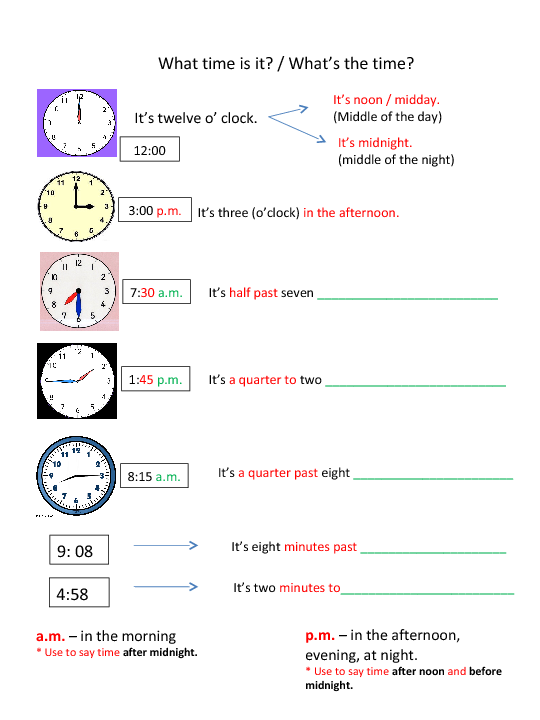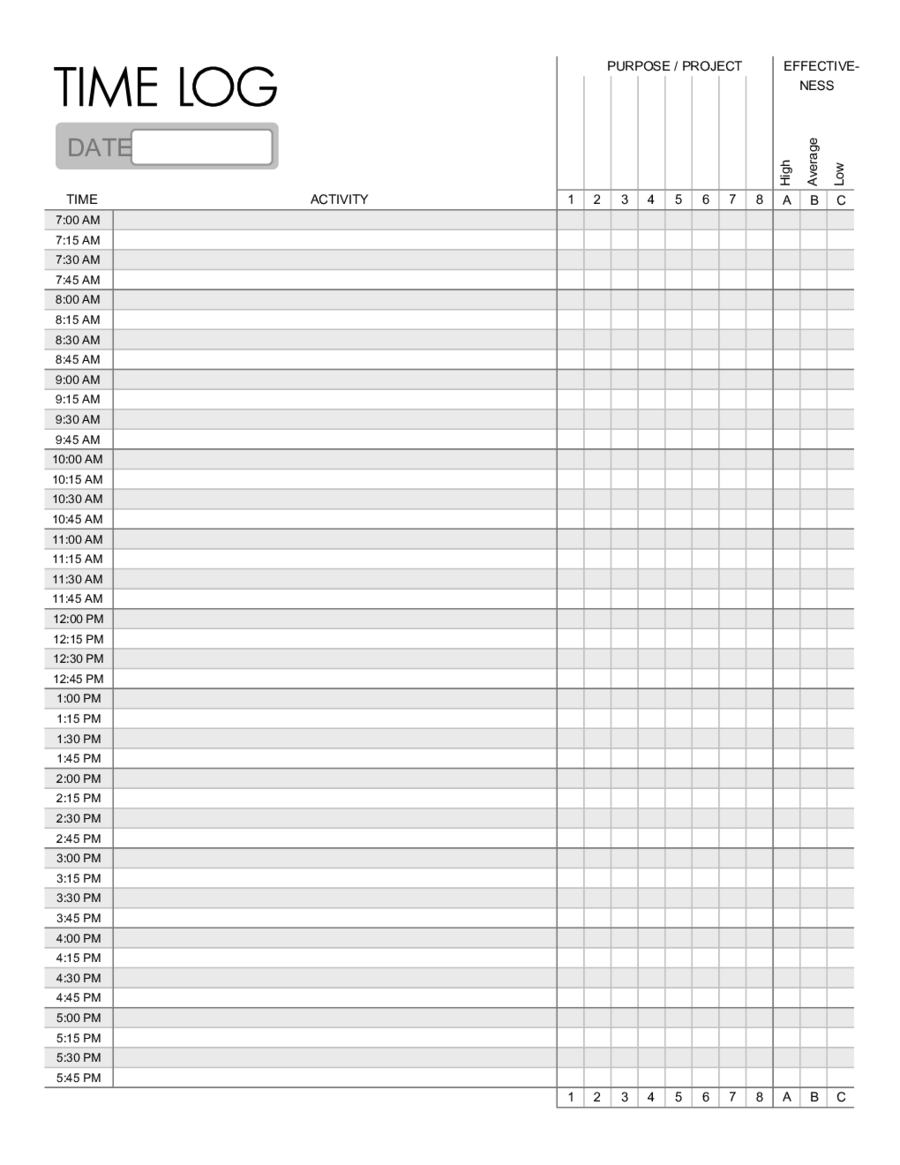An activity log provides a record of how you are spending your time on a daily and weekly basis. Similar to the time study template above, this time management spreadsheet captures all of your tasks in one place so that you can see exactly where your time is going. This Excel template is intended to record your full day, not just work hours. To use the template, keep track of all your activities over a period of time, and then assess how your time is being spent and where you'd like to make changes. Assessing how you spend your time or planning a weekly schedule might just sound like additional time-consuming tasks. However, a little prep work can go a long way toward boosting efficiency and saving time - not to mention reducing stress once you have a greater sense of control over how you use your time.
Whether you're a student, professional, parent or all three, your responsibilities and priorities may change from month to month and year to year. Time management involves organizing and planning your time so you can get the most out of your days and accomplish your goals. Choose the start time for your day, time interval, and the week's starting date, and then enter your daily class schedule along with any other appointments, activities, or deadlines. You may also want to dedicate certain hours to studying to make sure you have adequate time set aside. It's not always easy, but the payoff is enormous. The key is to start with a blank slate and to fill up your 168 hours only with things that deserve your time.
Time Management 168 Hours In A Week We all "know" that we only have 24 hours a day which equals to 1440 minutes or seconds . I'm surely not the first to point out that your week contains 168 hours. It's a staple of time management books and courses, as seen here and here. But until you go through the exercise yourself of adding up your weekly commitments, you probably won't find the almost three hours per day potentially left over. The key to effective time management is to use those hours wisely.
You may not know how much of your time is actually being used for daily activities such as sleeping, eating, showering, walking to class, waiting for the bus. Once you develop a control over your time, everything will just seem to fall into place. Through this walkthrough, you will learn how to use your time most efficiently. For example, you can set a weekly goal that you will sleep an average of 7 hours each night.
This means that if you slept only 6 hours on Monday and Tuesday, then you know you have to get two hours of extra sleep over the weekend. You can also use this to-do list template to create a list of items that you are waiting for others to accomplish, such as work projects or requested services. Another creative use is to create a list of distractions that are keeping you from focusing on tasks at hand.
Write down tasks or ideas that you want to tackle or remember so that you can stick to your current schedule. Anyone can use this template to create a master 10-week schedule, but students may find it particularly useful for semester planning. The 10-week calendar provides a blank slate for adding whatever activities and due dates you need to track. Planning a schedule over a longer time frame can provide a greater sense of organization and help you work toward longer-term goals. Don't forget to schedule time to make and review lists and schedules! Be realistic about how much time you spend on each activity.
Then you can create a master plan and reassign those hours to activities that add balance to your life. Time is our most valuable resource and it is in very limited supply at 168 hours a week. That is the time you have available every week to eat, sleep, work, exercise, and innovate. And after discounting sleep, eating, exercise and other necessities, you are left with not much time for those activities that can make a serious impact in your life. Whether it be the deliberate pursuit of adding value in the workplace, or forming a new path for your future, careful planning is key to fitting everything in.
There are many ways to achieve this planning, and time blocking is my favorite medicine of choice. I answer that if they keep track of exactly how they're spending their time, 15 minutes will seem like nothing. They'll likely find hours in their weeks–hours lost to activities that aren't meaningful or enjoyable in any sense. Over the years since I tried tracking my time, I've seen hundreds of time logs from people from all walks of life. Hours pass whether or not we are aware of where they go. Best to figure out where they go, so time–the ultimate limited resource–can be allocated to what matters, rather than what doesn't.
This template lists classes for each week day so that you can create a homework schedule, manage study time, and plan for upcoming due dates. Keeping track of all your assignments in one spreadsheet can give you an idea of how much time you need to devote to homework on a given day or week. You can edit the template for your specific classes, and adjust the dates. You can also practice effective time management in your home life, including with your chore schedule.
On this template, you can add a brief description of each chore along with the person responsible for completing it on a specific day. This simple spreadsheet is useful for families or shared houses with roommates who need to manage a rotating chores schedule. On this time management schedule template, you can set the time interval and start date to suit your needs. Time intervals range from 10 to 120 minutes, depending on the level of detail you want to include. An effective weekly schedule can include both fixed and flexible activities so that you have a thorough plan and know your routine. Now look at your most important and meaningful tasks.
Are you dedicating enough of your limited hours to them? Let's say that spending time with your children is one of your highest priorities in your 'everything else' bucket. But after completing your exercise, you find out that you are actually spending a lot less time than you want to with them. Make it a point to block off time slots on a weekly basis that you will dedicate to them. By blocking off that time, you prevent other less meaningful tasks from encroaching on what really matters to you.
Those activities that are most aligned with your four criteria and which are not getting the time they deserve, also need to have dedicated time blocks. As college students, you are very busy people, and to make those 168 hours effective, you have to do some planning. Simply, making the most of your time and energy! The Benefits of Time Management You are more productive. You feel more confident in your ability to get things done.
On weekdays, look at your schedule, and see if there's available low-impact space. Lots of people exercise in the mornings, because, as one trainer told me, there's always going to be a reason not to exercise at 4pm, and it's going to be a good reason. Alternate mornings with your spouse helping the kids get ready, and get up a little earlier so you can run or walk.
If your employer has an onsite gym, this is perfect — do the early AMs or your lunch hour. Even if a gym is not available, you can often walk around the parking lot briskly. This will clear your head and focus you for work in a way that an additional half an hour of emailing just can't do. Some people can walk to or from work, which is a great way to tag on extra activity.
Use this timeline template to create an organized weekly schedule for your study group. You can plan study sessions based on upcoming assignments and tests by tracking deadlines and relevant course content. This template also creates a log of study group meetings so that you can track previous activities and meeting dates.
You can use this Excel template to conduct a workplace time study, tracking how much time is being spent on certain tasks. Record all tasks in the first column, and then add the number of minutes spent on each item for each day. Fill out this template throughout the day to ensure accuracy, and be sure to include break times or unexpected activities that arise.
At the end of the week, you'll know the frequency and duration of interruptions. Create a weekly review with this Excel evaluation template. Assess task progress and use this information to plan your schedule for the following week. Employees can also use this template to create a simple report for managers. This is an easy way to mark successes while also keeping track of incomplete items. This time management calendar covers three months on a single sheet, and also includes space for additional notes.
A 90-day calendar may be useful for project planning, creating a schedule for a college semester, planning your summer months, and more. The template makes it easy to view your schedule for the extended time period at a glance. This time management sheet allows you to track your time usage along with the priority, status, and due dates of each task. You can modify the spreadsheet to include any additional information, and use the "Comments" column to record notes, provide instructions, or add important reminders. This template is helpful for organizing your to-do list or for creating a log of completed and pending tasks.
In work or family life, find duties that you can delegate or share with others to help alleviate your workload. This will vary for each individual, but some items on your schedule are fixed, meaning that they will occur at the same time each week. Others will occur occasionally or have flexibility around when they can be scheduled. Fixed events may include work hours, classes, meetings, mealtimes, church, children's activities, and hours spent commuting. Flexible items could include time allotted for exercise, household chores, appointments and errands, entertainment, and down time.
If you need a full-year calendar template, this Excel version provides all 12 months in a simple layout that is easy to view and modify. You can use the yearly calendar template for long-term planning while tracking your weekly and monthly schedules. Set both short- and long-term goals, and use the calendar to plan your steps toward meeting those objectives. When you create a financial budget, you subtract expenses from income and evaluate the difference. For a time budget, subtract all the time spent on various activities from the 168 hours available in a week.
This time budget template is a quick tool for assessing your time management and working toward a balanced schedule. This issue of lost time is one of my greatest struggles. Monday mornings often begin with a good cup of coffee and fresh ideas on how to plan my week. I meal plan, look at our calendar of events, make a to-do list, and even fill out a time blocking schedule for the day.
Everything looks great on paper as I gear up to accomplish great things. But slowly, day by day, the to-do list grows and the time slips away. And I am discouraged with the results because there is a disconnect between what I want to do, and the time I have available to do it.
This leaves us with 1 remaining bucket of time at our disposal for everything else. Since most of us work at least 8 hours per day, 5 days per week, this equates to 40 hours each week. The careers of many people often demand more than 40 hours each week and also have the added burden of commute time to and from the workplace.
For simplicity's sake, let's assume that most people spend one-third of their time working and commuting to work, which is 56 hours per week, or 1 bucket. Did you know that there were 168 hours in a week? I didn't until I read Laura Vanderkam's book '168 Hours.' That doesn't sound like a lot does it?! Effective time management skills are crucial particularly if you are in grad school, doing your Phd and/or are a working parent. In this post, I discuss the 168 hours that make a week and how to manage time wisely. These are those trivial activities that, once you get into them, are so comfortable that you just keep doing them.
It takes real resolve to limit yourself to just a few hours of TV or gaming a week, or just one fantasy sports team, or just 30 minutes a day on Facebook. But try keeping a keeping a diary and adding up the hours you're spending now, and you might just gain that resolve. Stephen Covey's "The 7 Habits of Highly Effective People" has become a must-read for both professional and personal time management junkies.
One of the book's main focuses is upon creating new habits so that staying on track and eliminating procrastination comes with ease. This should only take a few minutes because you can use your weekly schedule to create it quickly. Write your daily schedule on an index card or a daily planner. Carry your schedule with you so you can refer to it as needed and cross items off once they are completed. This last step provides a sense of accomplishment. You should be using eight hours to sleep each night, and you'll most likely be averaging three hours every day preparing and eating meals.
You'll spend some of that time in class, possibly some of it working, and some as free time. Of course you want to make time for family, exercise, and other activities. It reduces general living expenses , and reduces the cost of hiring a cleaner. If you are spending your weekends doing non-essential tasks, leaving no time to actually enjoy the weekend with your friends and family, you're not optimizing for your core competencies.
So much productivity and time management advice gets down to the micro level. We can be more productive if we change small habits. Laying out clothes for the next day before going to bed saves a few minutes in the morning trying to decide what to wear. Listening to podcasts while we do the dishes turns a chore into learning time. Doing squats while the microwave heats up our lunch avoids a trip to the gym. Even if you have evaluated your schedule, set attainable goals, and created a long-term plan, you may still find yourself procrastinating.
This worksheet can help you identify which activities you tend to put off or avoid altogether. Knowing what areas of your life are most affected by procrastination can provide insight into why you might be neglecting certain tasks and what you can do to change this. Keep track of work hour, used vacation and sick time, hourly rates, and income due with this weekly timesheet template. Hours and pay are calculated for each day, and a weekly total is provided as well. You can also modify the template to create a monthly timesheet, project timesheet, or to include additional information. Time management schedules are important workplace tools that help facilitate communication among employees, attendance tracking, and payroll calculation.
This template provides a weekly spreadsheet for managing multiple employee schedules. For each day of the week, enter each employee's name and where they will be working during specific hours; the template will then calculate total hours completed. To help you get started, check out the free, customizable templates that you can download or print. All of the templates offer simple formatting with a professional appearance. You'll find schedule and calendar templates, time management spreadsheets for Excel, and worksheets for Word and PDF. The book 168 Hours tackles the common excuse we all often use, and that is "I don't have enough time".























No comments:
Post a Comment
Note: Only a member of this blog may post a comment.